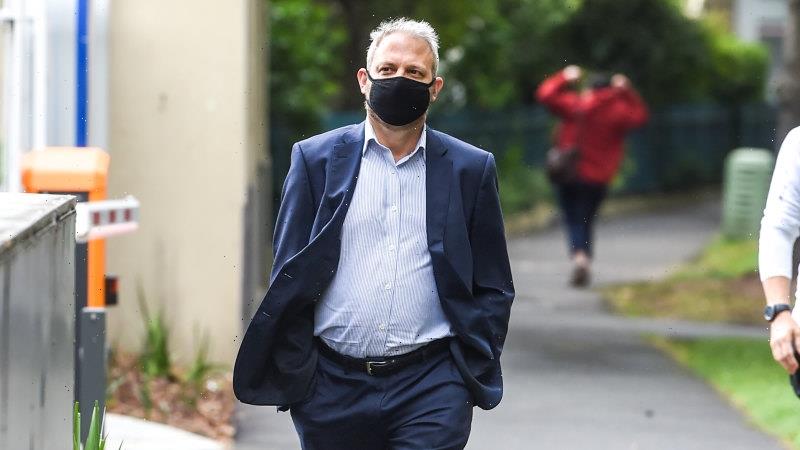For our free coronavirus pandemic coverage, learn more here.
Victoria’s Chief Health Officer Brett Sutton has told a coronial inquest into 45 deaths at St Basil’s that fewer coronavirus cases would have spread through the aged care home if its managers had co-operated more readily with a health order to stand down staff last year.
Had he not ordered the entire St Basil’s workforce be stood down, Professor Sutton told the court on Friday there would likely have been “substantially more infections and possibly deaths of residents” at the aged care home last year.
Victorian Chief Health Officer Brett Sutton arrives at the Coroners Court on Friday morning.Credit:Justin McManus
But the Chief Health Officer conceded he never got an assurance from Canberra that its replacement workforce at the predominantly Greek-speaking home could adequately care for residents before ordering out all of its staff.
State Coroner John Cain is examining why so many died with coronavirus at the Fawkner home.
On July 21 last year, Professor Sutton ordered out all staff at the home after deeming the entire workforce had been close contacts of those with coronavirus.
It forced the federal government to send in a replacement workforce. The inquest has heard this “surge” workforce was unable to properly care for the 117 residents at St Basil’s – 80 per cent of whom got coronavirus by the time the home was evacuated on July 31, 2020.
A resident is evacuated from St Basil’s on July 31, 2020.Credit:Justin McManus
Professor Sutton, under examination by Peter Rozen, QC, counsel assisting the coroner, admitted he was not aware whether this surge workforce was up to the job of adequately caring for the residents.
“Were you told that the Commonwealth were absolutely confident that they had it covered?” Mr Rozen asked Professor Sutton.
“I didn’t have some kind of strong and overarching assurance that it was all hunky-dory,” he responded.
Professor Sutton said the Health Department directed St Basil’s chairman Kon Kontis that the home’s workers had to be furloughed because many had coronavirus and could further spread the virus to residents, but there was “persistent non-compliance” with that order.
Mr Kontis, who is yet to appear before the inquiry, warned Health Department officials such a move would end disastrously. Ultimately, the home had to be directed by the authorities to stand down regular staff.
“We resisted that direction as much as we could, but unfortunately Victorian public health experts, who are doctors, said that this is a course that we must follow,” he and his centre manager said in a letter at the time.
Judge Cain is attempting to understand why St Basil’s didn’t have a better COVID-19 plan, why Professor Sutton ordered out all the home’s staff despite the warnings it could end badly, and why the Commonwealth – which has ultimate responsibility for aged care – failed to properly manage the unfolding situation when it brought in the “surge” workforce.
The instruction for the home to stand down its workforce was first made by Victorian public health authorities on July 19. On Friday, Professor Sutton said this was the right call. The replacement workforce did not enter the home until July 22.
“If St Basil’s had implemented the public health response as requested by the department on 19 July, 2020, before it was escalated to me … it would have resulted in fewer cases,” Professor Sutton told the court.
St Basil’s Home for the Aged in Fawkner.Credit:Joe Armao
Professor Sutton was asked by lawyers for St Basil’s whether he understood the allegation he was making against those who ran the home.
Daniel Gurvich, QC, acting for St Basil’s, told Professor Sutton that his statement about how events had unfolded at the home “could be read as a serious allegation being made by you against Mr Kontis and the management of St Basil’s. Do you understand that?“.
“I do understand that,” Professor Sutton responded. “The refusal to follow the direction, including a belief that close-contact staff were no more at risk to other staff and residents as a replacement workforce, likely contributed to further transmission [of COVID-19].”
Earlier in his examination, Professor Sutton explained he only intended that staff at St Basil’s be stood down if there was an adequate replacement workforce.
He also said that his order for staff to stand down so that a replacement workforce could be brought in by the Commonwealth did not contain an explicit instruction that the existing staff co-operate with the incoming workers. “It didn’t come to my mind that (co-operation) would be a specific direction that was required,” Professor Sutton said.
Hazardous waste is removed from St Basil’s in July 2020. Credit:Chris Hopkins
Of 237 people living and working at the nursing home at that time, only 49 did not get coronavirus. The inquest continues on Monday.
The Morning Edition newsletter is our guide to the day’s most important and interesting stories, analysis and insights. Sign up here.
Most Viewed in Politics
From our partners
Source: Read Full Article




